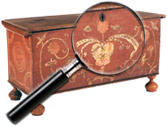Benjamin Perley Poore
Benjamin Perley Poore (1820 to 1887) was a significant early collector of American antiques. A writer by trade, Poore was born near Newbury, Massachusetts to parents Benjamin and Mary Perley Poore. The family estate called Indian Hill became the showcase for his eclectic assemblage of antiques.
As a youth Poore was influenced by trips to Europe and was especially fascinated by the old Scottish castles and manor houses. He later sought to recreate the romanticism of those Scottish castles and manor houses in Indian Hill, adding turrets and other medieval features to the building. The interior was embellished with architectural elements salvaged from historic buildings in line for demolition or remodeling. According to Elizabeth Stillinger’s The Antiquers, published in 1980, Indian Hill contained paneling from the Old Province House in Boston, which was remodeled in 1851, paneling from the John Hancock House in Boston, which was demolished in 1863, fluted pillars from the Old Brattle Street Church also in Boston, stairs from the Tracy House in Newburyport and a mantel from the Stuyvesant House in New York.i
Poore and his contemporary collectors were fascinated with the historical and political associations of an object over its aesthetic value. He gathered and displayed antiques to tell their story and recreate a romantic image of the past. The aesthetics of a piece was secondary to its historic relevance. Patriotism, romanticism, along with a feeling of nostalgia shaped Poore’s collection.
The interior of Indian Hill was filled with antiques in a wide range of periods and styles. Poore’s vast collection was an eclectic mix of furniture styles from Jacobean to Empire, suits of armor, portraiture, china, pewter and stained glass. He owned a sleigh bed once belonging to Napoleon and many pieces of furniture and china formerly in the White House. The association of these objects with their former owners was of great pride to Poore.ii
Poore would summer at Indian Hill, yet spent the majority of his adult life in Washington, D.C. where he was a well-known and well-connected writer, editor and newspaper correspondent. It was there he served as a Washington correspondent for the Boston Journal, writing a syndicated column that brought him national attention. He was also the editor of the Congressional Directory (1865).iii
Poore passed away in 1887 in Washington. In 1939 the family donated the Indian Hill property to the Society for the Preservation of New England Antiquities (now Historic New England). A serious fire in the 1960′s destroyed much of the property.
Bibliography Reference:
Stillinger, Elizabeth. The Antiquers. New York, NY: Alfred A. Knopf, 1980.
i. Elizabeth Stillinger, The Antiquers (New York, NY: Alfred A. Knopf, 1980), page 29.
ii. Elizabeth Stillinger, The Antiquers (New York, NY: Alfred A. Knopf, 1980), page 33.
iii. Elizabeth Stillinger, The Antiquers (New York, NY: Alfred A. Knopf, 1980), page 29.
Biographical sketch by p4A.com Contributing Editor Karl Pass.
